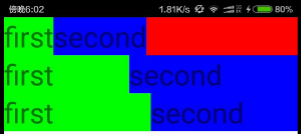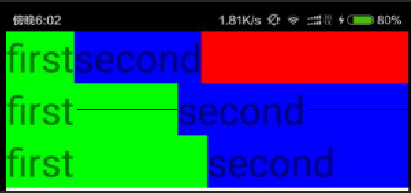【Android学习】android:layout_weight的用法实例
对于android:layout_weight的用法,用下面的例子来说明:
<LinearLayout xmlns:android="http://schemas.android.com/apk/res/android" xmlns:tools="http://schemas.android.com/tools" android:layout_width="match_parent" android:layout_height="match_parent" android:orientation="vertical" tools:context="com.chenming.test.MainActivity" > <LinearLayout android:layout_width="match_parent" android:layout_height="wrap_content" android:orientation="horizontal" android:background="#ff0000"> <TextView android:layout_width="wrap_content" android:layout_height="wrap_content" android:background="#00ff00" android:textSize="35sp" android:text="first"/> <TextView android:layout_width="wrap_content" android:layout_height="wrap_content" android:background="#0000ff" android:textSize="35sp" android:text="second"/> </LinearLayout> <LinearLayout android:layout_width="match_parent" android:layout_height="wrap_content" android:orientation="horizontal" android:background="#ff0000"> <TextView android:layout_width="wrap_content" android:layout_height="wrap_content" android:background="#00ff00" android:textSize="35sp" android:layout_weight="1" android:text="first"/> <TextView android:layout_width="wrap_content" android:layout_height="wrap_content" android:background="#0000ff" android:layout_weight="1" android:textSize="35sp" android:text="second"/> </LinearLayout> <LinearLayout android:layout_width="match_parent" android:layout_height="wrap_content" android:orientation="horizontal" android:background="#ff0000"> <TextView android:layout_width="0dp" android:layout_height="wrap_content" android:background="#00ff00" android:textSize="35sp" android:layout_weight="1" android:text="first"/> <TextView android:layout_width="0dp" android:layout_height="wrap_content" android:background="#0000ff" android:layout_weight="1" android:textSize="35sp" android:text="second"/> </LinearLayout> </LinearLayout>
以上是activity_main.xml布局文件,其效果如下:

对应刚好三行三个例子,由XML文件可以看到,红色表示空白区域,绿色表示第一个控件,蓝色表示第二个控件。
例子一:为正常的顺序排列,他们的 android:layout_width都是包含内容,所以长度为蓝色比较长,剩下的为空白区域。
例子二:在上一个例子的基础上,加入了分别加入android:layout_weight="1",weight的中文意思是权重,那么很明显,这个意思是两个控件的权重值1:1,但是要注意,这个不是说两个控件的长度是1:1,而是说在已有的长度下,把剩余的空白空间按照1:1再分给两个空间。所以,所谓的1:1指下图中的两条黑线是1:1,实际是蓝色控件长度大于绿色控件(因为second的英文长度比first长)。

例子三:那么,要如何能让蓝色控件长度等于绿色控件?只需让一开始的未分配1:1空白空间时候长度相等即可,所以例子三是在例子二的基础上把android:layout_width="wrap_content"改为android:layout_width="0dp",即宽度都为0而不是刚好包含内容,这样一来,剩余空白空间就是一整行,再按1:1分配就能是使得两个控件长度相等,也就是第三行例子三的样子。
所以android:layout_weight的用法要记住是分配剩余空白空间,而不是一开始的空间!后面改成2:3,4:5等等也都一样的道理。



 浙公网安备 33010602011771号
浙公网安备 33010602011771号